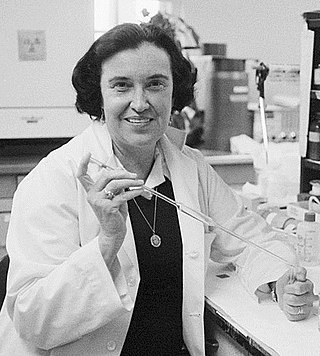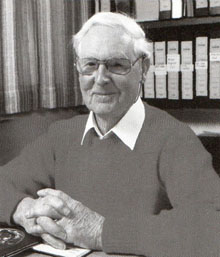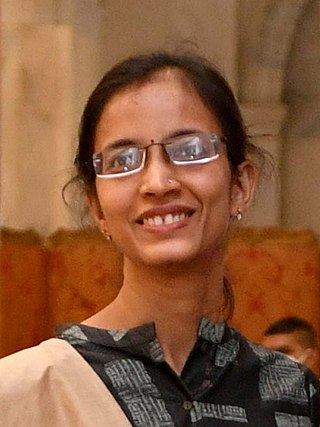
Rosalyn Sussman Yalow was an American medical physicist, and a co-winner of the 1977 Nobel Prize in Physiology or Medicine for development of the radioimmunoassay technique. She was the second woman, and the first American-born woman, to be awarded the Nobel Prize in Physiology or Medicine.

Frank John Fenner was an Australian scientist with a distinguished career in the field of virology. His two greatest achievements are cited as overseeing the eradication of smallpox, and the attempted control of Australia's rabbit plague through the introduction of Myxoma virus.

Shahjalal University of Science and Technology (SUST) is a public research based university in Sylhet, Bangladesh. It is the 8th oldest university of the country and the first university to adopt American credit system. The university is known for its pioneering research and education in the physical sciences and engineering. In 2016, SUST ranked as the top research university in Bangladesh by Scopus-SCImago institution ranking. In 2017, the university had highest research expenditure among all universities in Bangladesh. Following the success of SUST, twelve more STEM universities have been established in the country by the Government of Bangladesh.
This article discusses women who have made an important contribution to the field of physics.

Joan Elaine Argetsinger Steitz is Sterling Professor of Molecular Biophysics and Biochemistry at Yale University and Investigator at the Howard Hughes Medical Institute. She is known for her discoveries involving RNA, including ground-breaking insights into how ribosomes interact with messenger RNA by complementary base pairing and that introns are spliced by small nuclear ribonucleic proteins (snRNPs), which occur in eukaryotes. In September 2018, Steitz won the Lasker-Koshland Award for Special Achievement in Medical Science. The Lasker award is often referred to as the 'American Nobel' because 87 of the former recipients have gone on to win Nobel prizes.
Abdullah Al Mamun is a Bangladeshi physicist who is a professor of physics at Jahangirnagar University, Dhaka, Bangladesh.
Firdausi Qadri is a Bangladeshi scientist with specialization in immunology and infectious disease research. She has worked over 25 years on the development of vaccines for cholera and has expertise on other infectious disease like ETEC, Typhoid, Helicobacter pylori, rotavirus, etc. Currently, she is working as a director for Centre for Vaccine Sciences of International Centre for Diarrhoeal Disease and Research, Bangladesh (icddr,b). She also serves as chairperson of the Institute for developing Science and Health initiatives. Her scientific achievements lie in enteric infections and vaccines including Vibrio cholerae and enterotoxigenic Escherichia coli—major causes of severe diarrhea. She has also focused on studying the immune response in H.pylori infected people in Bangladesh and the responses in patients with typhoid fever as well as vaccinees.

Quarraisha Abdool Karim is an infectious diseases epidemiologist and co-founder and Associate Scientific Director of CAPRISA. She is a Professor in Clinical Epidemiology, Columbia University, New York and Pro-Vice Chancellor for African Health, University of KwaZulu-Natal, South Africa.
Molly S. Shoichet, is a Canadian science professor, specializing in chemistry, biomaterials and biomedical engineering. She was Ontario's first Chief Scientist. Shoichet is a biomedical engineer known for her work in tissue engineering, and is the only person to be a fellow of the three National Academies in Canada.

Emmanuelle Marie Charpentier is a French professor and researcher in microbiology, genetics, and biochemistry. As of 2015, she has been a director at the Max Planck Institute for Infection Biology in Berlin. In 2018, she founded an independent research institute, the Max Planck Unit for the Science of Pathogens. In 2020, Charpentier and American biochemist Jennifer Doudna of the University of California, Berkeley, were awarded the Nobel Prize in Chemistry "for the development of a method for genome editing". This was the first science Nobel Prize ever won by two women only.
Valerie Mizrahi is a South African molecular biologist.
Sandhya Srikant Visweswariah is a scientist and academic at the Indian Institute of Science, Bangalore, India. She is currently the Chairperson of the Department of Molecular Reproduction, Development and Genetics and the Co-chair of the Centre for Biosystems Science and Engineering, Indian Institute of Science. She additionally holds the position of Adjunct Professor, Faculty of Medicine and Dentistry, University of Bergen, Norway. Her research involves the investigation of the mechanism of signal transduction via cyclic nucleotides, phosphodiesterases and novel cyclases in bacteria. Most recently, she was awarded a Bill and Melinda Gates Grand Challenges Explorations Grant for her proposal entitled "A Small Animal Model of ETEC-Mediated Diarrhea".

Neena Gupta is a professor at the Statistics and Mathematics Unit of the Indian Statistical Institute (ISI), Kolkata. Her primary fields of interest are commutative algebra and affine algebraic geometry.
Rabia Salihu Sa'idpronunciation is a Nigerian physicist, professor of atmospheric and space-weather physics, and a researcher at Bayero University Kano. She conducts research in atmospheric and space weather physics, particle physics, and electronics. Sa'id is an advocate and mentor for young women in science with the Visiola Foundation and Peace Corps; she co-founded Nigeria's Association of Women Physicists. She is an advocate and mentor of Science, technology, engineering, and mathematics (STEM) education and is a facilitator for the British Council's Active Citizens' Programme.
Simone Anne Marie Badal-McCreath is a Jamaican chemist and cancer researcher. In 2014 she was one of five women awarded the Elsevier Foundation Award for Early Career Scientists in the Developing World for her creation of a lab at the Natural Products Institute to research the anti-cancer properties of natural Jamaican products. She currently lectures in Basic Medical Sciences at the University of the West Indies (UWI) in Mona, Jamaica.
Sangita Mukhopadhyay is an Indian molecular cell biologist, immunologist and the head of the molecular biology group at the Centre for DNA Fingerprinting and Diagnostics. Known for her studies on immunosuppression and infection biology, Mukhopadhyay is an elected fellow of all the three major Indian science academies namely the Indian National Science Academy, the Indian Academy of Sciences and the National Academy of Sciences, India. The Department of Biotechnology of the Government of India awarded her the National Bioscience Award for Career Development, one of the highest Indian science awards, for her contributions to biosciences in 2008.

The OWSD-Elsevier Foundation Awards for Early-Career Women Scientists in the Developing World are awarded annually to early-career women scientists in selected developing countries in four regions: Latin America and the Caribbean, East and Southeast Asia and the Pacific, Central and South Asia, and Sub-Saharan Africa.

Ganesan Venkatasubramanian is an Indian psychiatrist and clinician-scientist who works as a professor of psychiatry at the National Institute of Mental Health and Neurosciences, Bangalore (NIMHANS). Venkatasubramanian is known for his studies in the fields of schizophrenia, transcranial Direct Current Stimulation (tDCS), brain imaging, neuroimmunology, neurometabolism and several other areas of biological psychiatry. The Council of Scientific and Industrial Research, the apex agency of the Government of India for scientific research, awarded him the Shanti Swarup Bhatnagar Prize for Science and Technology, one of the highest Indian science awards, for his contributions to medical sciences in 2018. He is also one of the collaborating scientists in the NIMHANS-IOB Bioinformatics and Proteomics laboratory of the Institute of Bioinformatics (IOB) in Bangalore. Besides, he is an adjunct faculty at the Centre for Brain Research (CBR) in Bangalore.

Katalin Karikó is a Hungarian-American biochemist who specializes in RNA-mediated mechanisms. Her research has been the development of in vitro-transcribed mRNA for protein therapies. She co-founded and was CEO of RNARx, from 2006 to 2013. Since 2013, she has been associated with BioNTech RNA Pharmaceuticals, first as a vice president and promoted to senior vice president in 2019. She also is an adjunct professor at the University of Pennsylvania.
Beryl Rice Benacerraf was an American radiologist and professor of obstetrics, gynecology and reproductive biology and radiology at Harvard Medical School. She was a pioneer in the use of prenatal ultrasound to diagnose fetal abnormalities, including Down syndrome. In 2021, she was recognized as a "Giant in Obstetrics and Gynecology" by the American Journal of Obstetrics & Gynecology.










